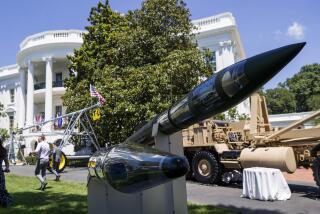Jordan to Deploy Soviet Anti-Air Missiles Soon
- Share via
BEIRUT — Jordan, traditionally one of the closest U.S. allies in the Arab world, has announced that it plans to deploy a Soviet-supplied air defense system early this year.
The announcement was made Saturday night by the Jordanian armed forces’ commander in chief, Lt. Gen. Sharif Zayed Shaker, during a speech to military officers in Amman, Jordan’s capital.
Shaker also said Jordan, which has in the past depended primarily on U.S. military equipment, is negotiating other arms purchases from European countries.
“Jordan is looking to conclude more deals with Britain and France in order to support our forces and strengthen (their) military structure despite our limited resources,” Shaker said, according to news service reports from Amman.
The Soviet air defense system purchased by Jordan is believed to consist primarily of surface-to-air missiles and radar to control them. The size of the purchase was not disclosed.
Initially, the Reagan Administration proposed selling Stinger anti-aircraft missiles to Jordan. However, King Hussein rejected the offer last March when the plan encountered resistance in Congress from supporters of Israel.
Afterward, Hussein indicated plans to turn to the Soviet Union and Western Europe as arms suppliers because, he said, America’s relationship with Israel has tilted the United States away from an evenhanded approach to the Middle East.
“We have turned to diversifying sources for our weapons after certain difficulties with the United States,” Hussein said in an interview published in October. “We bring weapons to defend ourselves against the danger of some ministers in the present Israeli government who claim that the Jordanian east side is also part of Israel.”
The Jordanian monarch was referring to the East Bank of the Jordan River. The Jordanian portion of the West Bank of the river has been occupied by Israel since the 1967 Six-Day War.
Jordan was believed to have turned to the Soviet Union for anti-aircraft missiles largely because Moscow offered easy credit terms, according to U.S. officials.
The economy of the kingdom has been hit hard by a combination of declining support payments from Arab oil producers and lower remittances from Jordanians working abroad.
Another pro-Western Arab country, Kuwait, purchased a Soviet air defense system last year after the Reagan Administration’s plan to supply Stinger missiles became stalled in Congress. The deal reportedly was for $325 million.
Ironically, the Soviet Union is the primary arms supplier to Jordan’s archrival, Syria.
The Damascus regime has received hundreds of millions of dollars worth of advanced missiles and tanks from Moscow in recent years. It reportedly negotiated an extension on its debt to the Soviet Union late last year.
Syrian pressure on Jordan has been increasing since Jordan restored relations with Egypt last September and Hussein played host in November to a meeting of the Palestine Liberation Organization’s so-called parliament in exile. Syria supported PLO factions that boycotted the meeting.
Hussein has reportedly assured the United States that despite the move to buy arms from Moscow, he will not alter his relatively moderate policies in the Arab world.
More to Read
Sign up for Essential California
The most important California stories and recommendations in your inbox every morning.
You may occasionally receive promotional content from the Los Angeles Times.













